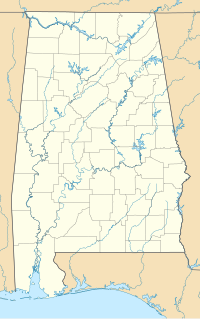
Clarke County is a county located in the southwestern part of the U.S. state of Alabama. As of the 2020 census, the population was 23,087. The county seat is Grove Hill. The county's largest city is Jackson. The county was created by the legislature of the Mississippi Territory in 1812. It is named in honor of General John Clarke of Georgia, who was later elected governor of that state.

Marengo County is a county located in the west central portion of the U.S. state of Alabama. As of the 2020 census, the population was 19,323. The largest city is Demopolis, and the county seat is Linden. It is named in honor of the Battle of Marengo near Turin, Italy, where French leader Napoleon Bonaparte defeated the Austrians on June 14, 1800.

Grove Hill is a town in Clarke County, Alabama, United States. At the 2020 census, the population was 1,818. It is the county seat of Clarke County and home of the Clarke County Museum.

Jackson is a city in Clarke County, Alabama, United States. The population was 5,557 at the 2020 census. It was one of three wet settlements in an otherwise-dry county.

Thomasville is a city in Clarke County, Alabama, United States. At the 2020 census, the population was 3,649. Founded as a late 19th-century railroad town, it has transitioned over the course of more than a century into a 21st-century commercial hub. It is the childhood hometown of author and storyteller Kathryn Tucker Windham.

Andalusia is a city in and the county seat of Covington County, Alabama, United States. At the 2020 census, the population was 8,805.

Brewton is a city in and the county seat of Escambia County, Alabama, United States. As of the 2020 census, the population was 5,276. Brewton is located in south central Alabama, just north of the Florida Panhandle.

New Market is an unincorporated community and census-designated place (CDP) in Madison County, Alabama, United States, and is included in the Huntsville-Decatur Combined Statistical Area. As of the 2020 census, the population of the CDP was 1,543. Although it was the first area settled in Madison County, the town has never been incorporated.

McIntosh is a town located in Washington County, Alabama, United States along U.S. Route 43. It is 12+1⁄2 miles (20.1 km) south of Wagarville and 44 miles (71 km) north of Mobile. It was named for William McIntosh, a prominent Creek chief of the nineteenth century. The town was incorporated on April 7, 1970. The population as of the 2020 U.S. Census was 206, down from 238 in 2010.

Camp Verde is a town in Yavapai County, Arizona, United States. As of the 2010 census, the population of the town is 10,873.

Whatley is a census-designated place in Clarke County, Alabama, United States. As of the 2010 census, its population was 225. It is named in honor of Franklin Benjamin Whatley. It has one site on the National Register of Historic Places, the Whatley Historic District.

Gainestown is an unincorporated community on the Alabama River in Clarke County, Alabama, United States. It was named for George Strother Gaines, who was the senior United States Indian agent in the region; he established a trading post here in 1809 for business with the Choctaw, the predominant tribe.

Ackerville is an unincorporated community in Wilcox County, Alabama, United States. Ackerville has one site included on the National Register of Historic Places, the Ackerville Baptist Church of Christ.

Pleasant Hill is an unincorporated community in Dallas County, Alabama.
Wheeler is an unincorporated community in Lawrence County, Alabama, United States. Wheeler had a post office at one time, but it no longer exists. Wheeler has two sites on the National Register of Historic Places, the Tidewater-type cottage known as Bride's Hill and the former home of Joseph Wheeler, Pond Spring.

Perdue Hill is an unincorporated community in Monroe County, Alabama. It has one site listed on the Alabama Register of Landmarks and Heritage, the Perdue Hill Masonic Lodge. The home of William B. Travis is located along U.S. Route 84 in Perdue Hill and was moved here in 1985 from Claiborne.

Claiborne is a ghost town on a bluff above the Alabama River in Monroe County, Alabama.
Choctaw Corner was a former town in Clarke County, Alabama, United States. It is named for the nearby Choctaw Corner, which marked the border between the native Choctaw and Creek peoples prior to the Indian removal. The community was one of the earliest settlements in the county.
Houston is an unincorporated community in Winston County, Alabama, United States. It was the county seat from 1858 until 1884, when the seat was moved to Double Springs. Houston has one site on the National Register of Historic Places, the log Houston Jail.

Fort Glass was a stockade fort built in July 1813 in present-day Clarke County, Alabama during the Creek War.



















